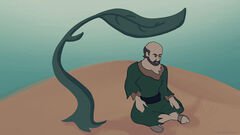Thoughts for the Day
Sunday, 10th September 2023: Jonah: 4
God Jonah 3 and 4 Jonah
Reading : Verses from Jonah, Chapters 3 and 4

When God saw what the people of Nineveh did, how they turned from their evil ways, God changed his mind about the calamity that he had said he would bring upon them; and he did not do it. But this was very displeasing to Jonah, and he became angry. He prayed to the Lord and said, ‘O Lord! Is not this what I said while I was still in my own country? That is why I fled to Tarshish at the beginning; for I knew that you are a gracious God and merciful, slow to anger, and abounding in steadfast love, and ready to relent from punishing. And now, O Lord, please take my life from me, for it is better for me to die than to live.’ And the Lord said, ‘Is it right for you to be angry?’ Then Jonah went out of the city and sat down east of the city, and made a booth for himself there. He sat under it in the shade, waiting to see what would become of the city.
The Lord God appointed a bush, and made it come up over Jonah, to give shade over his head, to save him from his discomfort; so Jonah was very happy about the bush. But when dawn came up the next day, God appointed a worm that attacked the bush, so that it withered. When the sun rose, God prepared a sultry east wind, and the sun beat down on the head of Jonah so that he was faint and asked that he might die. He said, ‘It is better for me to die than to live.’
But God said to Jonah, ‘Is it right for you to be angry about the bush?’ And he said, ‘Yes, angry enough to die.’ Then the Lord said, ‘You are concerned about the bush, for which you did not labour and which you did not grow; it came into being in a night and perished in a night. And should I not be concerned about Nineveh, that great city, in which there are more than a hundred and twenty thousand people who do not know their right hand from their left, and also many animals?
(Lectionary, New Revised Standard Version)
Thoughts
We continue our story of Jonah (see Jonah 1, Jonah 2, Jonah 3) and the themes contained in the story - God is in control, Thankfulness, and Repentance. Our last theme is the Sign of Jonah and what that means today. In Luke's Gospel (and Matthew's) we get mention of this mysterious sign of Jonah (see Luke 11.29-32). Jesus says that the Pharisees and other religious leaders have a lesson to learn from the Ninevites, who when they heard the prophecy given by Jonah that God would destroy them unless they repented of their sin, asked for God's forgiveness. Jonah remained unconscious of his own need for mercy and continues his self-righteous attitude to the end of the story. But the 'Sign of Jonah', indicates God's mercy to all penitent sinners, whether Jew or Gentile. The book challenges some of our understanding about God:
- That He is omnipresent, in other words he is everywhere at the same time, and we cannot escape His reach.
- That He has sovereignty over all things, humans and the natural world.
- That His compassion extends to Jews and Gentiles (whether they are Christian, Muslim, Hindu, Seikh, Jain, or Agnostic).
Ultimately we are all left to answer God's question to Jonah: "And should I not be concerned about Nineveh?" And what does the answer teach Christians? What does is say about our attitudes and behaviour to those different to ourselves?
Prayer
Father-God,
who forgave the people of Nineveh,
because they repented of their sin,
help us not to be judgemental
but to welcome all people
as Your Son taught us.
May we learn to acknowledge
our own sin and be truly penitent,
in the hope that Your mercy
will be granted to us.
Amen.
Anyone wanting to explore more about God, will like this article: